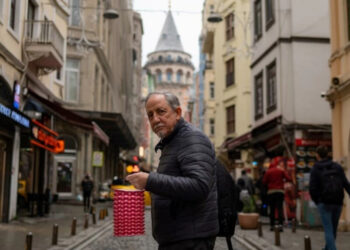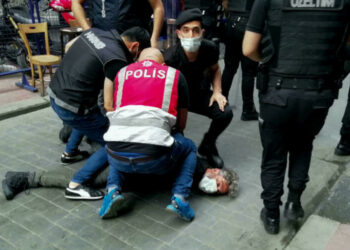On Saturday, a Turkish-German writer found himself detained by the Spanish police. What landed him in custody was a “red notice” alert issued by Ankara through Interpol, the international police agency designed to fight crime across international borders.
He was released on Sunday, but the controversy over his situation morphed into a wider diplomatic spat between Turkey and Germany, and reignited debates about the use and misuse of Interpol’s red notice system.
Spanish authorities will not allow the writer, Dogan Akhanli, to leave Madrid until they fully assess Ankara’s extradition request. The case has driven a wedge between Turkey and Germany, prompting swift rebuke from Chancellor Angela Merkel, whose comments included criticism of the abuse of the system by authoritarian-minded countries.
“We must not misuse international organizations like Interpol for such purposes,” Ms. Merkel said. Her remarks reflect a widely-shared concern among EU leaders that some countries, including Turkey, Russia, Venezuela and Iran, systematically abuse the system to target political opponents and dissidents abroad.
Red notices are alerts issued by Interpol member countries that request a person be arrested for extradition. A red notice is supposed to target criminals and be backed up by a national arrest warrant in the requesting country.
Parliamentary Assembly of the Council of Europe (PACE) Rapporteur Bernd Fabritius joined the fray and criticized Turkey.
In a statement on Monday, Mr. Fabritius condemned Turkey’s red notice against the writer and its abuse of the system.
He invited “Interpol to re-examine it in light of the rule outlawing politically-motivated interventions and to delete the Notice as appropriate.” The rapporteur urged Interpol to impose sanctions against Ankara if Turkey is found to be abusing the system.
Earlier this month, a Turkish-Swedish reporter, Hamza Yalcin, also ended up in jail in Spain when Ankara sought his imprisonment through Interpol mechanism. Mr. Yalcin was released pending trial. Late last year, a French-Kurdish journalist faced a criminal investigation in Belgium through similar notice.
These cases have given additional ammunition to critics of the Turkish government who allege that Ankara is simply using the system to clamp down on critical journalists abroad.
Mr. Akhanli’s arrest comes against the backdrop of a massive crackdown by the Turkish government against political opponents after a failed coup last year. More than 150,000 public servants have been dismissed in a sweeping purge, and at least 50,000 people have been jailed. Turkey revoked the passports of dismissed public workers and tens of thousands of other people.
The unraveling of domestic politics in Turkey has cross-border reverberations across Europe given the size of the scattered Turkish diaspora that lives throughout the European Union.
Whatever happens in Turkey certainly has echoes in Germany and other EU countries. The April referendum led to a tense diplomatic standoff between Ankara and a number of EU nations when Turkish ministers attempted to hold rallies in European capitals to advance the cause of President Recep Tayyip Erdogan.
Austrian Foreign Minister Sebastian Kurz, an unapologetic and avowed critic of the Turkish president, accused Mr. Erdogan of “trying to instrumentalize ethnic Turkish communities in Germany and Austria.”
“He polarizes and brings Turkish conflicts into the EU,” Mr. Kurz told the Die Welt newspaper.
Mr. Erdogan’s global hunt for political foes has a certain fallout for relations with Turkey’s Western allies and strangles cooperation between law enforcement agencies. Part of the reason is Turkey’s apparent disregard for EU standards during the legal pursuit of alleged coup suspects or Erdogan critics at home and abroad.
Ankara’s aggressive push is best illustrated in the indiscriminate and excessive use of Interpol’s Red Notice system to target political opponents and dissidents, rather than criminals.
The issue lies at the heart of an ongoing controversy about red notice abuses by certain countries.
Interpol was set up by European countries in Vienna in the early 1920s to bolster international police cooperation. After World War II, the organization moved its headquarters to Lyon, France.
It now has 190 member countries, each with the power to issue red notices.
“That Interpol has been open to abuse is not in dispute,” Jago Russell, the chief executive of Fair Trials International, a London-based organization that helps victims of unjust criminal charges all over the world, told The Globe Post.
“Angela Merkel’s recent comments have highlighted how Interpol can be misused by certain regimes. Interpol has an important role to play in the fight against serious crime, but it is undermined when used to target journalists, rights activists, or voices of dissent,” he said.
Interpol did not respond to a request for comment for this article.
A five-month investigation by the International Consortium of Investigative Journalists (ICIJ) in 2011 and a comprehensive 2013 study by Fair Trials details how Interpol’s internal review mechanism fails to differentiate between criminal cases and politically-motivated arrest warrants for dissidents.
The ICIJ report underscored that Interpol’s constitution forbids it from getting involved “in any invention or activities of a political, military, religious or racial character.”
In practice, the system can be exploited.
“Despite INTERPOL’s commitment to neutrality and human rights, the report shows how INTERPOL’s review mechanisms are not vigorous enough to prevent this abuse, with severe implications for the people concerned: damage to reputation, loss of work, inability to travel and even arrest and extradition,” the Fair Trials report said.
A misused red notice can be ruinous for the person targeted. The warrant turns a person’s life upside down once their name appears on an Interpol database during a security check at a border or at an airport or a hotel.
In the 2011 study, ICIJ analyzed a snapshot of Interpol’s red notices as published on December 10, 2010. They included 7,622 red notices issued at the request of 145 countries.
About one-quarter of the warrants came from countries with a poor record on individual freedoms and political rights, Public Integrity noted.
By 2016, the number of applications for red notices jumped to 12,787. In addition to Turkey, Russia is also among the countries that are accused of abusing the system to target political opponents.
Following the Fair Trials report, at least 100 people contacted the organization to say they were wrongly targeted by Interpol notices.
No one named in a red notice has the power to challenge it in their own court or before the international courts, potentially leaving them in legal limbo for a considerable amount of time while the host country assesses the request.
Opponents of Russian President Vladimir Putin have found themselves locked in a European country, sometimes in police custody, after Moscow issued a red notice.
Mukhtar Ablyazov, a former minister in Kazakhstan, was granted political asylum in the U.K. in 2011 after he fell out with the Kazakh president. Both Kazakhstan and its ally Russia have requested red notices for Mr. Ablyazov, and his ordeal highlights how the red notice system can cripple people’s lives.
He was placed behind bars in France in 2013, and spent three years in jail until French authorities finally ruled in late 2016 that Paris should not extradite him to his home country, Kazakhstan, due to the significant risks for his safety and wellbeing.




















